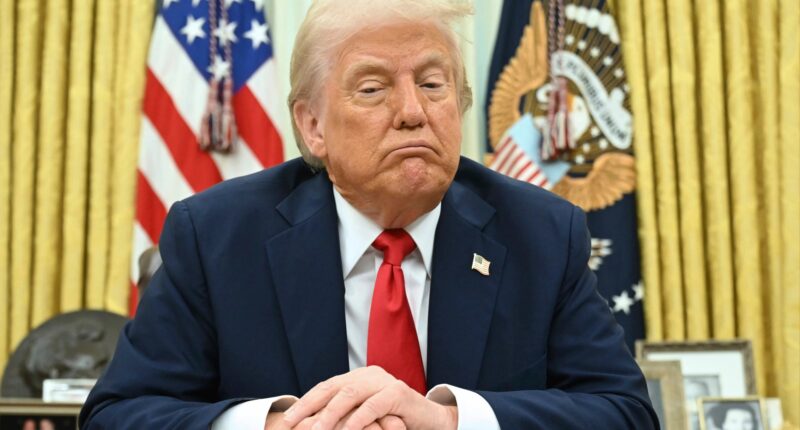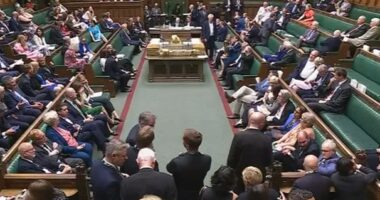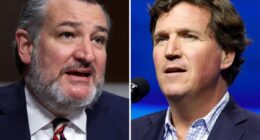During a recent appearance in the White House Rose Garden, Donald Trump made a surprising move by pulling out a hand grenade from his jacket pocket, removing the pin, and tossing it into the air.
The explosion was watched by many millions around the globe, and left governments and businesses shell-shocked and reeling from the blast.


It is important to note that this action did not result in the commencement of a global conflict, and none of the journalists present during his address on “Liberation Day” were harmed.
However, the significant impact of Trump’s declaration imposing extensive tariffs on imports to the United States from virtually all nations cannot be overstated.
Trump’s MAGA fans cheered him to the rafters for putting American workers first and urging companies to bring their factories to the US to avoid the tariffs, supposedly creating millions of new jobs, boosting the US economy and resetting world trade on a fairer basis.
But political leaders and business chiefs around the world looked on in horror as the prospect of their own job losses and economic recessions loomed, while economists pointed out that American import tariffs will ultimately be paid by US consumers in the form of higher prices for everything from cars to white goods, tech gadgets to fashion, and even food and drink.
So, has the US President just saved the American economy? Or launched a trade war that could see the entire planet lurch into a long and damaging global recession?
The truth is, nobody really knows for sure and we won’t be able to assess the true impact of that massive explosion until the smoke clears — which could take years.
The Liberation Day announcement — as Trump called it — was fairly straightforward.
The US has hit its trading partners with brand-new tariffs, some kicking in this weekend and others next week.
Most countries, including the UK, face ten per cent price hikes on their exports to America, while some 60 countries will be hit with a range of higher ones — up to 54 per cent for China.
The sense of relief in 10 Downing Street was palpable in the hours following the announcement, as Sir Keir Starmer’s team learned the UK faces HALF the European Union’s tariff of 20 per cent.
Leave voters can rightly cheer that outcome as a clear Brexit dividend but the damage to the UK economy caused by a ten per cent tariff will still be very real.
Our £60billion of annual exports to the US make this our largest export market outside the EU.
Thousands of jobs in the car, steel and aluminium industries are likely to go thanks to a 25 per cent tariff applied to UK exports of these goods to the US.
Chancellor Rachel Reeves now faces even tougher choices in her Budget this autumn, with more spending cuts and tax rises on the agenda.
Not that this Government really needed any external help to trash our economy, thanks to its higher taxes, never-ending red tape — and costly Net Zero policies that have forced up energy prices for businesses and consumers alike.
David and Goliath
The real question now is: what will happen next?
White House advisers insist the tariffs are only a temporary measure, to tackle what they call “punitive” rates on US exports, and bring trading partners to the table.
While Starmer’s government is consulting UK businesses on what, if any, retaliatory action Britain should take, the reality is that our economy is David to the US’s Goliath and we can’t win a trade war with our much bigger Atlantic cousin.
So, any response is likely to focus less on retaliating and more on finally getting that much talked about free trade deal over the line.
But we are not fully in control of our own economic destiny, because the EU and other nations are already threatening retaliatory tariffs, which will end up hitting not just American consumers but Brits as well.
This could be the start of a spiralling trade war that could potentially see long- standing allies become bitter enemies, making the world a much poorer and more dangerous place.
Even Trump’s rhetoric in the Rose Garden risked ramping up emotions, as he talked about how other countries had “looted, raped, pillaged and plundered” America to enrich themselves at the expense of the US taxpayer.


Of course, predictions of his tariffs ushering in Trumpageddon may be vastly overstated.
After all, Trump likes to see himself as the great disrupter but at the same time loves to make a deal.
If other nation states respond by cutting their tariffs on US exports, the American tariffs may be very short-lived and we will have little to worry about.
The blast from his Liberation Day grenade could well reverberate for many years to come
Julia
And if Trump succeeds in enticing thousands of companies to return to the States, creating millions of jobs and boosting the American economy, and if the likes of the EU drop their external tariffs, that could usher in a golden age of free trade that sees the world economy grow while we all enjoy the riches that would bring.
But — and it’s a big but — we won’t see growth in the US or anywhere else unless businesses have confidence and certainty about the future. Unpredictable international tariffs make that impossible.
And no one builds a multi-million-dollar factory anywhere on a whim — those investments take years of planning.
Trump has certainly lived up to his reputation for unpredictability with his tariff announcements this week.
Now the UK and the rest of the world can only wait and see.
The blast from his Liberation Day grenade could well reverberate for many years to come.
Video won’t teach boys, Keir
WHEN I was at school, you always knew when the teachers had given up because they just put a video on in a bid to keep us all quiet.
Now it’s the Prime Minister who has given up on the nation’s children.

Sir Keir Starmer has called on every school to show the troubling new Netflix series Adolescence to pupils to help educate them about the dangers of the internet and “incel” culture.
The PM said he had been shocked by the drama’s plot involving a 13-year-old boy arrested for stabbing a girl to death after she mocked him for being an incel – an involuntarily-celibate loser unable to get a girlfriend.
The drama is undoubtedly brilliant but why should we take away four hours of our children’s valuable learning time in the classroom by sitting them in front of a screen?
If the PM is genuinely worried about how many unhappy and potentially dangerous teenage boys are walking our streets, we need less focus on malign influencers like Andrew Tate and more on positive images of modern masculinity for our boys to admire.
It’s not online role models we should worry about, it’s the lack of role models in many boys’ lives that really matters – the absent dads, the lack of male teachers, the constant mocking and criticism of men simply for being men.
Making kids watch a Netflix drama won’t solve anything.

















